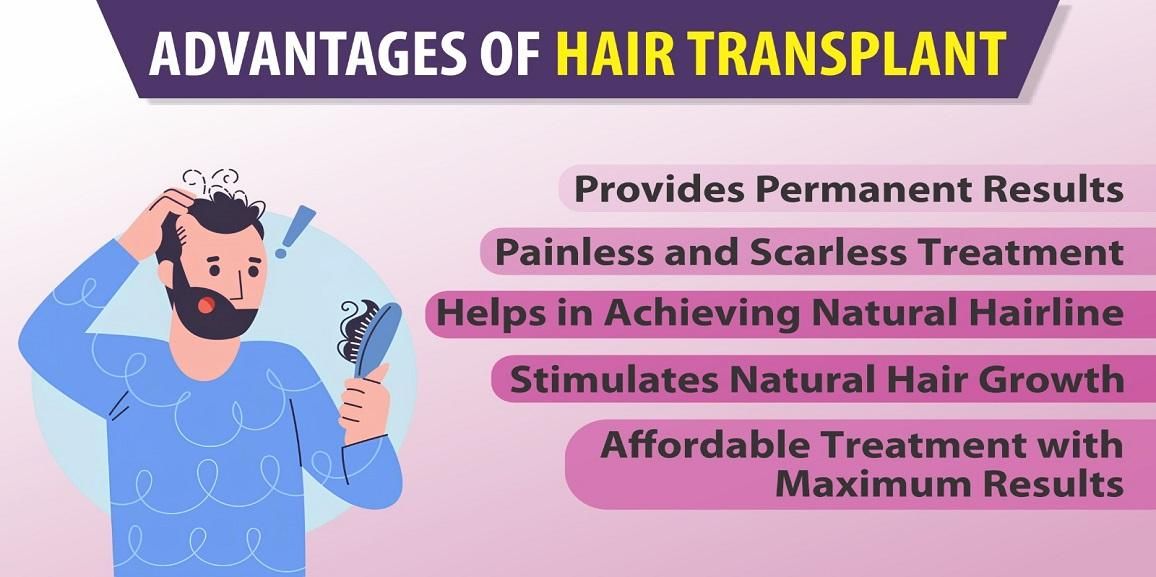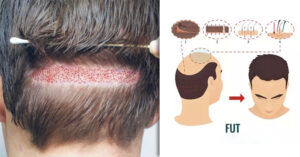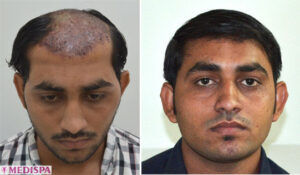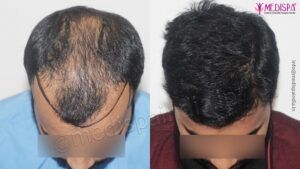
Hair loss is a common occurrence, with most people experiencing the loss of 50-100 hairs per day. However, when the hair loss exceeds this range, it may be a sign of a more serious issue. We all understand the panic that sets in when we notice an increased rate of hair loss that seems unstoppable. Dealing with hair loss can be a painful and devastating phase of life, especially when we are unable to halt its progression. Initially, many people tend to overlook the early signs of hair loss, but as it becomes more noticeable, we become desperate to find a solution. In our quest for a permanent solution, we often try various available treatment options, but the results of most cosmetic products are questionable.
Jaipur and Delhi are well-known for their exceptional hair transplant facilities and utilize cutting-edge technology for the treatment. These cities are preferred for their world-renowned surgeons who specialize in hair transplant procedures. Medispa clinic for hair transplant in Jaipur and Delhi has been a leader in this industry for more than ten years, consistently delivering outstanding hair transplants. Dr. Suneet Soni, a globally recognized expert, is renowned for his innovative and remarkable ability to create a natural-looking hairline with artistic precision.
Genetic baldness at a glance
Pattern baldness, also known as androgenic alopecia, is a form of hereditary hair loss. It occurs when hair follicles become oversensitive due to genetic malfunction, leading to thinning or shrinking of the hair and eventually hair loss. As time goes on, the hair loss progresses, resulting in the formation of a larger bald area. This bald area continues to expand, ultimately leaving only a strip of hair at the back and sides of the head.
To determine the extent of hair loss, the Norwood classification is used, which categorizes baldness into seven stages, each representing a higher level of hair loss. The hair at the back and sides of the head remain unaffected as they lack androgenic receptors, making them resistant to the genetic factors causing hair loss. This ensures that these areas will retain their hair in the long term.
Treatment options for hair loss
The problem of hair loss has various solutions that individuals choose from. These solutions are explained as follows:
- Natural oils and cosmetic products: Many individuals who experience hair loss attempt to self-treat their issue by using cosmetic products that claim to treat hair loss. If the hair loss is temporary, it may resolve on its own and credit is mistakenly given to these products. However, permanent hair loss cannot be treated without medical intervention.
- Temporary measures: There are numerous options available in the market, such as wigs, extensions, and prosthetic hairs, which can be customized to meet the patient’s needs. However, these aids require regular maintenance and replacements, making them a burdensome choice for long-term hair loss management. Additionally, high-quality temporary measures can be quite expensive if used for an extended period and may not look natural. Therefore, it is evident that this approach will not provide a permanent solution to the problem.
- Medications: Minoxidil and finasteride are two commonly recommended medications for hair loss, as their benefits have been substantiated. However, the results achieved with these medications may relapse and become unpredictable once the medications are discontinued. Long-term use of these medications is not advisable, as they can have side effects, particularly with the use of finasteride. Therefore, once again, this treatment approach is not a viable option for long-term hair loss management.
- Hair transplant: Hair transplantation is widely regarded as the most effective solution for hair loss problems. This treatment method is highly favored by individuals experiencing hair loss due to its long-lasting results and the ability to achieve a natural appearance. In order to determine if hair transplantation is indeed the superior choice among other treatment options, let us delve into the details of this procedure.
Is hair transplant procedure sensitive?
The hair transplant procedure requires careful consideration and thorough research in order to achieve successful results. It is crucial to choose a skilled surgeon and a reputable clinic to ensure the best outcomes.
In terms of the procedure itself, it involves extracting hair grafts from the donor area, creating channels or slits in the recipient area, and then transplanting the grafts to the balding area.
The sensitivity of the procedure lies in the fact that it involves handling delicate hair follicles, which are inherently fragile. Expertise is required to handle these follicles properly, making the procedure highly sensitive. Every step, from the selection to the transplantation of the follicles, must be approached with utmost care, as each decision made by the surgeon directly impacts the success of the surgery. Additionally, thorough planning prior to the procedure is essential for its success, requiring a holistic approach and extensive knowledge.
Hair transplant for hair loss treatment
Hair loss can be a distressing issue, but there is hope in the form of hair transplant treatment. You might be wondering if a hair transplant is the right solution for your baldness. Well, let me assure you that hair transplantation is currently the only permanent solution available. The transplanted hair follicles are your own, which means they will follow the same hair development cycle as your existing ones, resulting in natural hair growth.
One of the great advantages of hair transplantation is that it is a painless process. Once the healing period is over, there is no need to maintain the transplanted hair. The surgery itself is performed under local anesthesia, ensuring a comfortable experience for the patient.
When performed correctly and with the latest technology, hair transplantation can yield highly satisfying results. Modern procedures have made it possible to achieve optimum hair growth in just one session.
If you are suffering from pattern baldness, hair transplantation may be a viable option for you. However, it is crucial that the procedure is carried out by qualified professionals to ensure its success.







